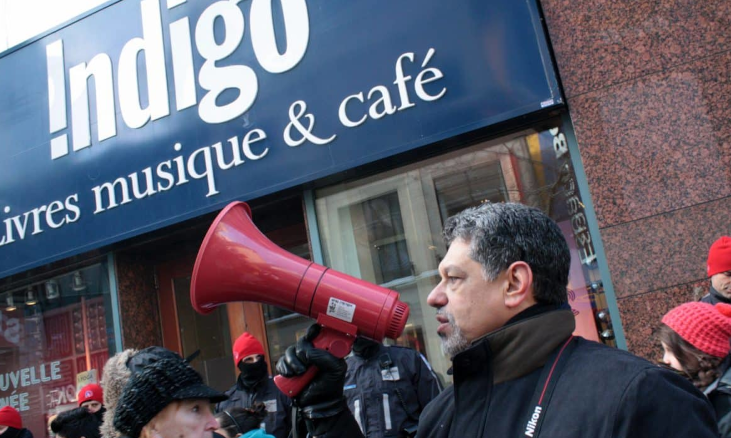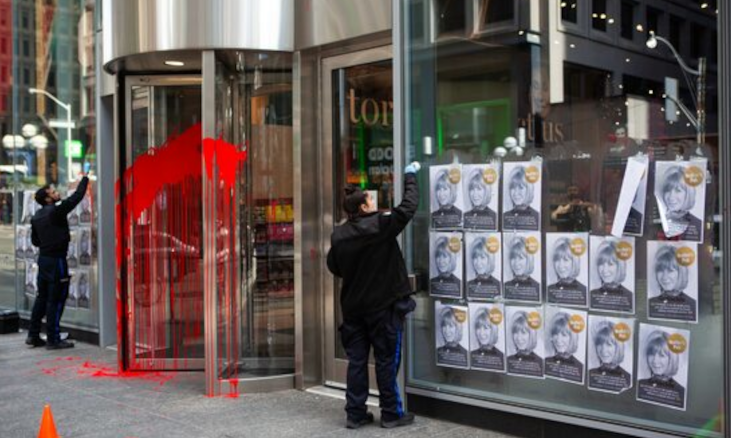From The Breach (Martin Lukacs)
On Wednesday [November 22nd] at 5:30 a.m., Sharmeen Khan woke up to a police officer in her bedroom shining a flashlight in her face.
Soon, there were several officers in her hallway. Ordered to get up, police watched her and her partner get dressed, before she was handcuffed.
The apartment of the Toronto bookkeeper and educator was then searched and ransacked: drawers emptied, laundry dumped on her bed, dozens of posters removed from poster tubes and scattered around the apartment.
Across the city, a half dozen other people were also having their homes raided. Front doors were broken, computers and cell phones were confiscated, and anyone present was placed in handcuffs, including the elderly, leaving disturbed and distressed families in their wake.
It’s a style of operation that one policing expert said likely cost hundreds of thousands of dollars, if not millions, and is usually reserved for “gun or drug” busts.
But the alleged crime in this case is very different: plastering posters and splashing washable red paint onto the windows of a Toronto Indigo bookstore.
The protest against Indigo CEO Heather Reisman, who runs a foundation that supports foreigners to join Israel’s military, is being “treated as a suspected hate-motivated offence,” according to a police press release.
But lawyers and progressive Jewish organizations are decrying the arrests and charges for trying to “silence” activism in solidarity with Palestinians, who have endured Israeli bombardment in Gaza the past six weeks.
They say Reisman is an entirely legitimate protest target, especially at a moment when Israel’s military has killed 14,000 Palestinians, many of them children, with UN experts warning of a “risk of genocide.”
“Armed police raiding activists’ homes to execute warrants in the early morning is an egregious overreach,” said Irina Ceric, an assistant professor in the Faculty of Law at the University of Windsor. “It appears to be an attempt to intimidate and terrorize these activists.”
Hate crime allegations ‘ridiculous,’ Jewish organizations say
When the posters and paint were splashed on Indigo at Bay and Bloor Street on Nov. 10, media headlines were almost unanimous: this was a hate-motivated act.
A Global News headline was “Toronto Indigo store splashed with red paint, posters attacking Jewish founder.” CTV ran with “’Vile antisemitic attack:’ Police investigating graffiti targeting Indigo CEO outside downtown Toronto store.” Even independent media critic Jesse Brown of Canadaland tweeted that a “Jewish-owned bookstore [was] vandalized.”
Most of the coverage neglected to mention that, for more than 15 years, activists with various organizations have campaigned for a boycott of Indigo over CEO Reisman’s support for the Israeli military.
Rachel Small, a Jewish organizer with Jews Say No to Genocide and World Beyond War, said characterizing these actions as antisemitic or a hate crime is “ridiculous.”
“Jewish organizations have been calling out Reisman and her pro-Israeli military actions for years,” she said. “She has made it her mission through her foundation to provide direct financial support to Canadian citizens to join an Israeli military that is now engaging in an ongoing genocide in Gaza. Deeply irresponsible media coverage has amplified a misleading story and laid the groundwork for the Toronto police to inappropriately investigate this as a hate crime.”
Established in 2005, the HESEG Foundation offers scholarships to foreigners to encourage them to join the Israeli army and continue their studies in Israel.
To receive the scholarship, these “lone soldiers” must join the Israeli military and complete a term of active service—thus eliciting criticism that Reisman is contributing to the Israeli military’s human rights violations in the occupied Palestinian territories.
According to CRA filings, the foundation handed out at least $5.5 million in scholarships and grants in 2022 and $6.5 million in 2021.
The posters pasted on the Indigo store on Nov. 10 were an image of a satirical book cover, stamped with “Heather’s pick,” entitled “Funding Genocide,” and a fake quote saying “I’m happy to use profits from your purchases to fund the Israeli army and bomb civilians.”
She is named as the CEO and “Chief Occupation Lover.”
Ceric said the Toronto police’s press release, which states the investigation is being “treated as a suspected hate-motivated offence,” seems designed to confuse, implying that hate crime charges have already been laid and suggesting that police think it’s inevitable that the Attorney General will sign off on actual hate crime charges.
Police did not reply to The Breach’s request for comment by the time of publication.

Activist campaigns have targeted Indigo CEO Heather Reisman’s support for the Israeli military since 2006. Credit: Flickr
Raids normally reserved for ‘guns and drugs’
Kevin Walby, an associate professor of criminal justice at the University of Winnipeg and an expert on police tactics, said he’s “never seen” a large police raid and a hate crime investigation like this for postering or splashing paint on private property.
“This kind of raid is more typical for a high-risk warrant where you have one or two suspects who have guns or drugs,” Walby said. “Or it’s what you’d expect for an intervention against an organized hate group that was planning to imminently attack another group with weaponry.”
Walby said that an operation of this size would have cost hundreds of thousands of dollars if not millions. It would require the sign-off of many people, including superintendents and possibly even the chief of police.
“Police are not acting like blind Lady Justice, in an unbiased manner,” he said. “They are influenced by a climate in which Palestinian solidarity protests are being delegitimized by the media and by politicians.”
Walby also suggested that Canadian police may have “allegiances” to their Israeli counterparts.
Police chiefs from across Ontario have previously travelled to Israel to attend events hosted by the Israeli police.
Canadian police also work as advisors and trainers for the Palestinian Authority’s security forces in the West Bank, which are supported by Israel. Amnesty International has documented these forces engaging in a “chilling campaign of repression cracking down on peaceful protests with unlawful force, targeting journalists, civil society activists, and lawyers with arbitrary arrests and torturing detainees.”
Walby said the arrests were “clearly politically motivated.”
“If police were interested in stopping hate-motivated activities, those are not hard to find. But police appear desperate to intimidate this movement, discourage people from getting together in the streets, and stop them from taking direct action for freedom and justice for Palestinians.”
“Going after peace activists with a ‘hate-motivated’ charge brings disrepute to the idea of a hate crime. A hate charge like attacking someone because of their nationality, ethnicity, sexuality, or religion is a very serious charge. But that has nothing to do with what happened. Instead, police appear to have jumped on a smear campaign against people who put up some posters.”
The consequences of a ‘smear’ campaign
Those arrested include community organizers, teachers, legal workers and labour activists.
According to organizers familiar with the cases, seven houses were raided between 4:30 and 6:00 a.m.
Police cruisers camped out in front of one home through the night, scaring its residents.
In another, parents were handcuffed in view of their children.
In yet another, family members were told by police not to speak their mother tongue, a non-English language.
One other person was not home when police arrived in the morning, so police broke down the door. The person returned later in the day to find the door off its hinges, the house entirely accessible, and a patio chair thrown into the front garden.
Organizers say police had arrest warrants at 1 p.m. the day before, meaning daytime arrests could have been made.
“Police had arrest warrants, so they could have come at a more normal time,” said University of Windsor law professor Ceric. “There were no allegations of violence in this situation, no expectation that there were weapons endangering anyone. It was completely unnecessary to execute the warrants in this way.”
One person had been arrested the previous week, and three more turned themselves in on Thursday. All are scheduled to appear in court in January 2024.
When Khan was finally released from detention on Wednesday afternoon, she returned to a west-end Toronto home thrown into disarray.
Since the dawn raid, she has had trouble sleeping.
And after police released the names of those arrested, and they were published in a front page story in the Toronto Sun, her social media accounts have been inundated with racist and sexist messages, including suggestions she be raped.
“I’m afraid of people finding out where I live,” she said. “There’s so much actual hate out there.”


